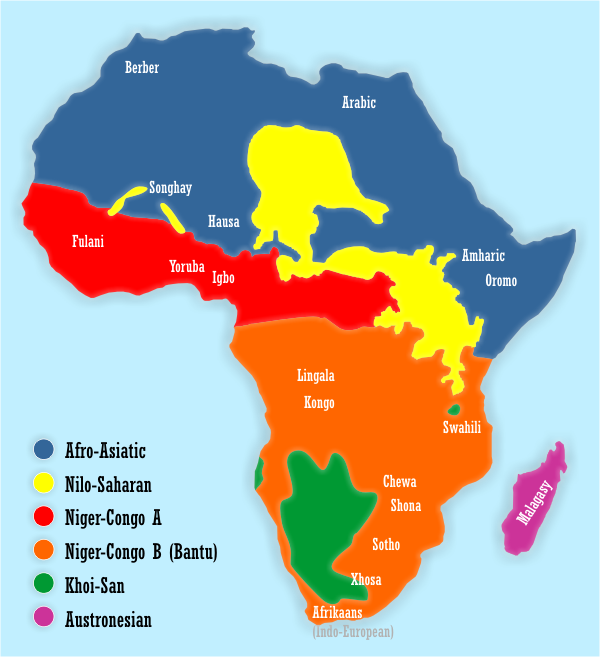Part of the uncertainty comes from a lack of data, but even if we knew everything about these languages, they still might not fit neatly into groups - the millennia of close contact and free movement among ethnolinguistic groups means that most African languages might not slot into neat, linear family trees the same way that the languages of more recent migrants, like Indo-Europeans, do. Given this backdrop, it's shocking that right smack in the middle of Subsaharan Africa is a huge swath of area, with as many as a third of all Africans speaking a set of unmistakably close linguistic cousins, sharing ideosyncratic grammatical features and most of their vocabulary.
 |
| A Shona mother in Zimbabwe will call her infant a mwana. For a Swahili speaker in Kenya, on the other side of the Bantu zone, the word for "child" is also mwana. Coincidence? Linguists think not. |
These are the Bantu languages, a remarkably cohesive subfamily of the Niger-Congo clade spoken throughout central, eastern, and southern Africa. As it turns out, this internal similarity is thanks to a huge agricultural revolution and migration a few millennia ago, an ethnolinguistic explosion on par with the spread of Austronesians or Indo-Europeans, that I'll cover on Wednesday. Today, between 200 and 350 million people natively speak a Bantu language, a category that includes languages like Swahili, Zulu, Shona, and the Xhosa language spoken by Nelson Mandela and Trevor Noah. But aside from their size and spread, why should we as linguists be interested?
 |
| Orange areas are predominantly Bantu. |
The Bantu languages, as it turns out, are chock-full of amazingly odd linguistic features. Almost all of them are restricted to simple CV syllables, and have register tone systems (bizarrely, languages in the northwest part of the Bantu zone have "mirror-image" tone systems, with a low tone where other Bantu languages have high, and vice versa). Many of them also feature southern Africa's infamous clicks, probably an innovation picked up from Khoisan languages. Their most unique and well-known trait, though, might be in their morphology.
The Bantu languages share a set of noun classes, similar to European noun genders, but with waaaaay more. Proto-Bantu is thought to have had about 19 (although singular and plural forms count as two different classes, following the tradition of whichever old-school linguist thought that was a good idea.) The classes are divided on roughly semantic grounds, with each class mostly containing nouns of a particular broad category, and are marked with a prefix. The fun happens when that same prefix gets glommed onto modifiers and verbs to agree with the noun in a giant, sentence-wide alliteration party! You can get things like:
Watoto wadogo wamekisoma.
"The small children have read the book."
It's like Spanish noun-adjective agreement on steroids!
In less interesting typology, Bantu languages tend to be strongly head-initial, with agglutination on the verb marking tense, voice, and polypersonal agreement.
Unfortunately, many of the mysteries of the Bantu family haven't yet been tangled out, and most of the languages lack the lavish documentation of similarly-sized languages of Europe. There are a few good resources online, but I couldn't find a free descriptive grammar of even a single Bantu language online. I put what I did find below, but if you know of an actual grammar of any Bantu language at all that's online and not behind a paywall, pleasepleaseplease let me know and I will add it!
If you have any thoughts, corrections or suggestions please comment below or email me at conorstuartroe@yahoo.com, and as always please investigate further!
Further reading:
The Language Gulper
Wikipedia
A very 90s reference website
A very 90s comparative dictionary
Niger-Congo languages
Shona dictionary
No comments:
Post a Comment